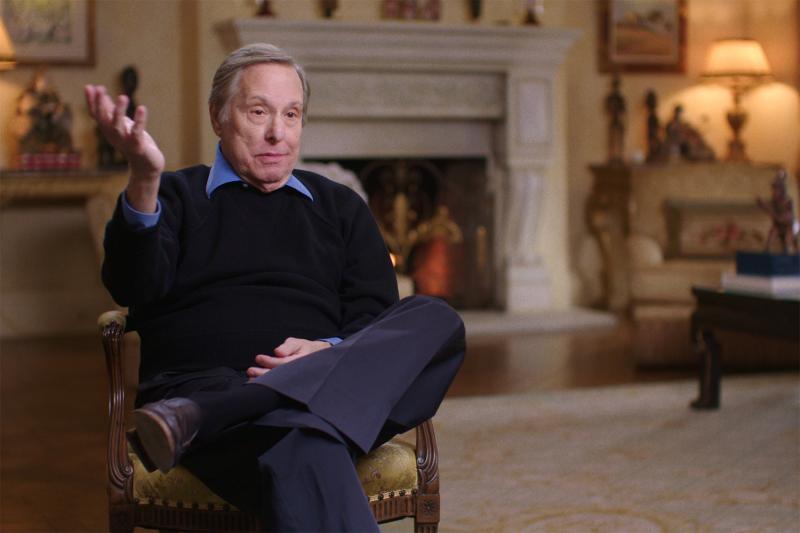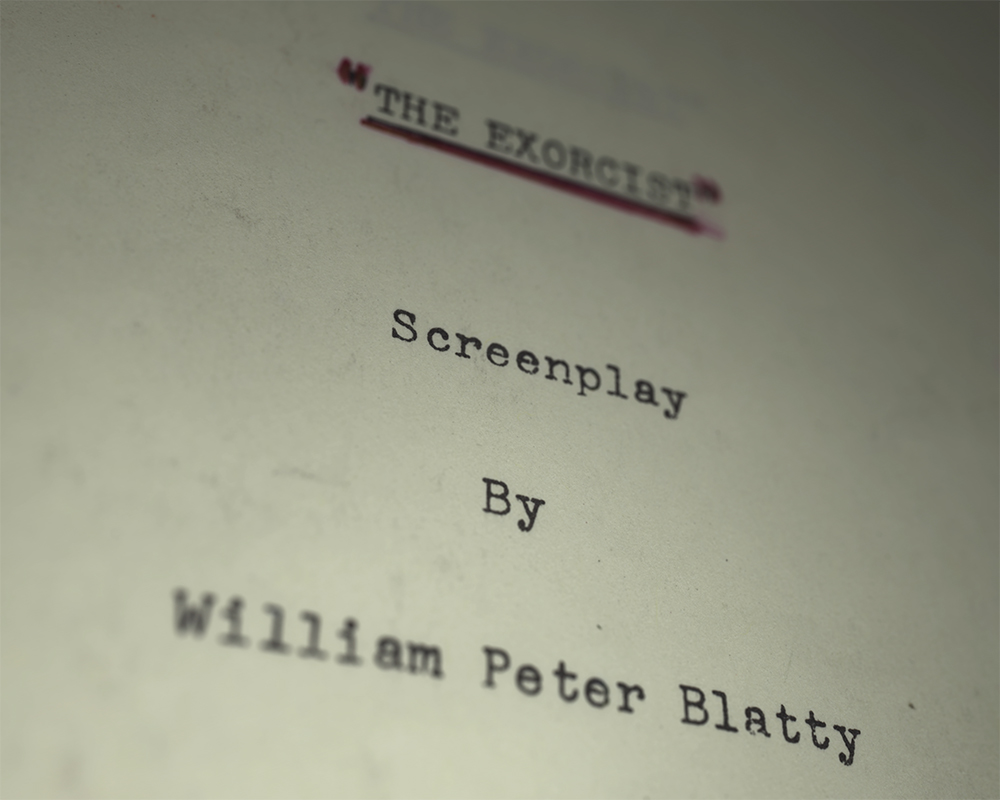Leap of Faith review – Alexandre O Philippe examines ‘The Exorcist’ | reviews, news & interviews
Leap of Faith review – Alexandre O. Philippe examines ‘The Exorcist’
Leap of Faith review – Alexandre O. Philippe examines ‘The Exorcist’
The director tackles the Oscar-winner in feature-length interview with William Friedkin

“Films are about the mystery of fate or the mystery of faith,” proclaims director William Friedkin in Alexandre O. Philippe’s latest documentary, Leap of Faith. At 84 years old, Friedkin proves himself to be a master of storytelling, not only behind the camera but in front of it, spiritedly discussing the genesis of his horror masterpiece with Philippe.
Unlike the Swiss filmmaker’s previous works 78/52, which tackled the shower scene in Pyscho, or Memory: The Origins of Alien, Leap of Faith consists mainly of a single talking-head interview with Friedkin. It could feel like a DVD extra, or a masterclass series, but thanks to Friedkin’s captivating presence and Philippe’s use of archive footage, the documentary is a much richer experience.

This is a pleasant, easy watch in which Friedkin systematically, but also candidly, discusses the film's influences, casting and scoring. Most interesting is his perspective on the religious themes in the adaptation of his friend William Blatty’s book that Friedkin’s film was based on.
It’s fair to say that, in the nearly fifty years since its release, the film has had legions of fans. Academics, critics and more have pored over its material, ranging from the infamous ‘curses’ during production, to the sensational reactions upon the film’s release (on this subject, it’s also worth seeing Mark Kermode’s 1998 documentary, Fear of God, currently available on iPlayer). What makes Philippe’s documentary captivating is hearing about the film straight from the source. Friedkin, although proud of the work and its legacy, has no hesitation admitting the problems he has with it, including the death of Karras, which he still believes is problematic (which incidentally, is where the title of the documentary comes from).
Some of what Friedkin says has been heard before: firing a gun to elicit reactions of shock, punching the (now disgraced) real priest Fr William O’Malley, or the way Mercedes McCambridge gargled eggs, knocked back scotch (when she was a reformed alcoholic) and smoked cigarettes to create the terrifying voice of the demon Pazau. These are now the stuff of filmmaking legend, and it’s entertaining to witness Friedkin reflect on getting away with the unconventional methods that would likely see him end up in court today.
However, there are also more revealing moments. There’s the lesser-known story of Friedkin’s encounter with composer Bernard Herman who, having recently left America after falling out with Hitchcock, was to "save" The Exorcist with a score that Friedkin subsequently rejected. It’s an incident that Friedkin describes as one of ‘the worst disappointments of my life’. More revelatory is the claim that Blatty offered to forfeit any percentages on the film if he could have played Father Karras. We have to take what Friedkin says in good faith, seeing as Blatty passed away in 2017.
If we treat Leap of Faith merely as an arresting "making of", then Philippe’s approach appears negligent. But this underestimates Philippe as a filmmaker and critic. The production history is a framework that Philippe uses to explore not just Friedkin’s methods, but also his aesthetic, religious and philosophical beliefs. Friedkin gives as much time to the subject of fate as he does faith, earnestly suggesting that it was the will of "The Movie God" that led him to make the feature. If this sounds grandiose, or delusional, Friedkin comes across as neither. Rather he humbly states that we live in a state of perpetual ignorance, and the ambiguity that runs though his films is there because it reflects the nature of life, or for that matter, death.
Indeed, Leap of Faith is much more than a "making of" feature. Instead, it is a deep dive into Friedkin’s philosophical and aesthetic outlook, reflecting on grand questions of faith and fate. It’s so enjoyable, it could have been twice as long.
rating
Share this article
The future of Arts Journalism
You can stop theartsdesk.com closing!
We urgently need financing to survive. Our fundraising drive has thus far raised £49,000 but we need to reach £100,000 or we will be forced to close. Please contribute here: https://gofund.me/c3f6033d
And if you can forward this information to anyone who might assist, we’d be grateful.

Subscribe to theartsdesk.com
Thank you for continuing to read our work on theartsdesk.com. For unlimited access to every article in its entirety, including our archive of more than 15,000 pieces, we're asking for £5 per month or £40 per year. We feel it's a very good deal, and hope you do too.
To take a subscription now simply click here.
And if you're looking for that extra gift for a friend or family member, why not treat them to a theartsdesk.com gift subscription?
more Film
 theartsdesk Q&A: director Kelly Reichardt on 'The Mastermind' and reliving the 1970s
The independent filmmaker discusses her intimate heist movie
theartsdesk Q&A: director Kelly Reichardt on 'The Mastermind' and reliving the 1970s
The independent filmmaker discusses her intimate heist movie
 Blu-ray: Wendy and Lucy
Down-and-out in rural Oregon: Kelly Reichardt's third feature packs a huge punch
Blu-ray: Wendy and Lucy
Down-and-out in rural Oregon: Kelly Reichardt's third feature packs a huge punch
 The Mastermind review - another slim but nourishing slice of Americana from Kelly Reichardt
Josh O'Connor is perfect casting as a cocky middle-class American adrift in the 1970s
The Mastermind review - another slim but nourishing slice of Americana from Kelly Reichardt
Josh O'Connor is perfect casting as a cocky middle-class American adrift in the 1970s
 Springsteen: Deliver Me From Nowhere review - the story of the Boss who isn't boss of his own head
A brooding trip on the Bruce Springsteen highway of hard knocks
Springsteen: Deliver Me From Nowhere review - the story of the Boss who isn't boss of his own head
A brooding trip on the Bruce Springsteen highway of hard knocks
 The Perfect Neighbor, Netflix review - Florida found-footage documentary is a harrowing watch
Sundance winner chronicles a death that should have been prevented
The Perfect Neighbor, Netflix review - Florida found-footage documentary is a harrowing watch
Sundance winner chronicles a death that should have been prevented
 Blu-ray: Le Quai des Brumes
Love twinkles in the gloom of Marcel Carné’s fogbound French poetic realist classic
Blu-ray: Le Quai des Brumes
Love twinkles in the gloom of Marcel Carné’s fogbound French poetic realist classic
 Frankenstein review - the Prometheus of the charnel house
Guillermo del Toro is fitfully inspired, but often lost in long-held ambitions
Frankenstein review - the Prometheus of the charnel house
Guillermo del Toro is fitfully inspired, but often lost in long-held ambitions
 London Film Festival 2025 - a Korean masterclass in black comedy and a Camus classic effectively realised
New films from Park Chan-wook, Gianfranco Rosi, François Ozon, Ildikó Enyedi and more
London Film Festival 2025 - a Korean masterclass in black comedy and a Camus classic effectively realised
New films from Park Chan-wook, Gianfranco Rosi, François Ozon, Ildikó Enyedi and more
 After the Hunt review - muddled #MeToo provocation
Julia Roberts excels despite misfiring drama
After the Hunt review - muddled #MeToo provocation
Julia Roberts excels despite misfiring drama
 London Film Festival 2025 - Bradley Cooper channels John Bishop, the Boss goes to Nebraska, and a French pandemic
... not to mention Kristen Stewart's directing debut and a punchy prison drama
London Film Festival 2025 - Bradley Cooper channels John Bishop, the Boss goes to Nebraska, and a French pandemic
... not to mention Kristen Stewart's directing debut and a punchy prison drama
 Ballad of a Small Player review - Colin Farrell's all in as a gambler down on his luck
Conclave director Edward Berger swaps the Vatican for Asia's sin city
Ballad of a Small Player review - Colin Farrell's all in as a gambler down on his luck
Conclave director Edward Berger swaps the Vatican for Asia's sin city
 London Film Festival 2025 - from paranoia in Brazil and Iran, to light relief in New York and Tuscany
'Jay Kelly' disappoints, 'It Was Just an Accident' doesn't
London Film Festival 2025 - from paranoia in Brazil and Iran, to light relief in New York and Tuscany
'Jay Kelly' disappoints, 'It Was Just an Accident' doesn't

Add comment